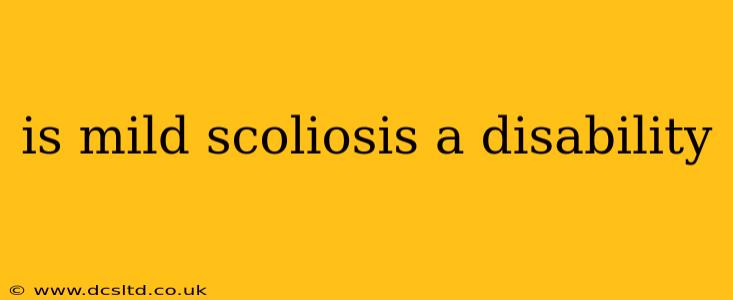Is Mild Scoliosis a Disability? Understanding the Complexities
Scoliosis, a sideways curvature of the spine, affects millions worldwide. The question of whether mild scoliosis qualifies as a disability is complex and depends on several factors. There's no simple yes or no answer. This article explores the nuances, addressing common questions and providing clarity on this important topic.
What is considered "mild" scoliosis?
Mild scoliosis is generally defined as a Cobb angle of less than 25 degrees. The Cobb angle is a measurement used by doctors to quantify the degree of spinal curvature. A smaller angle indicates a less severe curve. While a mild curve might not cause noticeable symptoms, it's crucial to monitor its progression, as it can worsen over time.
Can mild scoliosis limit daily activities?
Does mild scoliosis affect my ability to work?
This depends entirely on the individual and the nature of their work. For many with mild scoliosis, it poses no limitations on their professional life. However, individuals with certain physically demanding jobs might experience some limitations. Factors like prolonged standing, heavy lifting, or repetitive movements could exacerbate discomfort. In such cases, reasonable accommodations might be necessary in the workplace. The determination of whether mild scoliosis affects work ability is highly case-specific and depends on the individual’s condition and their job requirements.
Can mild scoliosis prevent me from participating in sports or physical activities?
Generally, mild scoliosis does not prevent participation in most sports and physical activities. However, certain high-impact or twisting movements might be problematic. It's essential to discuss participation in specific sports with a doctor or physical therapist to ensure it's safe and doesn't worsen the curvature. Modified exercise routines or adaptive strategies may be necessary.
Does mild scoliosis qualify for disability benefits?
This is a crucial question and the answer is often "no" for mild scoliosis alone. Disability benefits typically require a demonstrable and significant limitation in daily living activities. Mild scoliosis rarely fulfills this criterion without other contributing health factors. The severity of the curvature, presence of pain, and overall functional limitations are key factors considered in disability evaluations. Each case is reviewed individually by the relevant authorities.
What other factors influence the disability determination?
Several other factors can significantly influence the decision regarding disability benefits:
- Associated pain and symptoms: The presence of chronic pain, nerve compression, or other symptoms associated with the scoliosis significantly impacts the assessment.
- Progression of the curve: If the curvature progresses rapidly or causes increasing functional limitations, this increases the likelihood of disability status.
- Other medical conditions: Co-existing health problems can compound the difficulties, making it more likely that an individual qualifies for disability benefits.
- Age and physical limitations: Older individuals may experience a greater impact from mild scoliosis compared to younger individuals due to age-related physical changes.
Conclusion:
Determining whether mild scoliosis constitutes a disability is a multifaceted evaluation. While mild scoliosis might not significantly impact daily life for many, it's essential to consult with a healthcare professional for personalized assessment and guidance. If limitations in daily life arise due to scoliosis, documenting those limitations thoroughly is crucial when pursuing disability benefits. The presence of pain, the progression of the curve, and other health conditions are all vital factors in the decision-making process. Remember, each case is unique, and individual circumstances must be considered for accurate evaluation.
